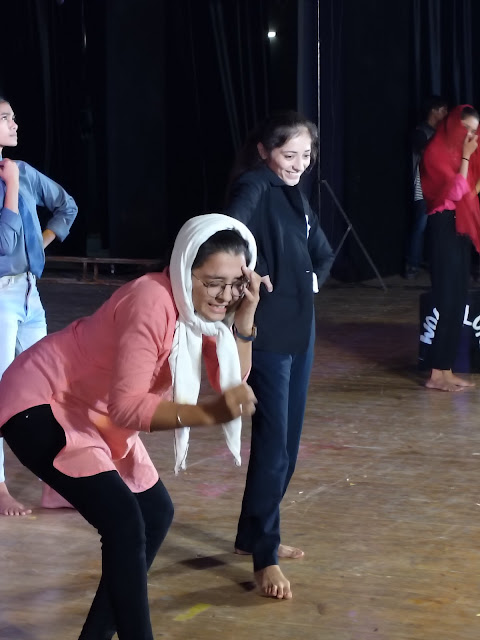1. પંડિત ઉદયશંકર નૃત્ય મંચ : એમફી થિયેટર
2. પૃથ્વીરાજ કપૂર નાટ્ય મંચ : અટલ ઓડિટોરિયમ
3. અવિનાશ વ્યાસ સંગીત મંચ : નવો કોર્ટ હોલ
4. રાજા રવિ વર્મા કળા મંચ : બાહ્ય અભ્યાસક્રમ ભવન
5. દુલા ભાયા કાગ સાહિત્ય મંચ : અંગ્રેજી ભવન
.jpg)


Watching and acting in the skit was a different experience. The skit addressed social issues in a satirical way, and many performances depicted this well. It covered topics like unemployment, problems in education, and the challenges women face, especially highlighted in Stree 3. The skit stressed the need for women's empowerment and raised thought-provoking questions with themes like “Gandhi Marte Kyun Nahi Hai,” while bringing everyone together with the message “Hum Sab ek Hai”. The skit included the experiences of those who do not fit into the male-female binary, highlighting their discrimination and lack of opportunities.
By using humor the skit balanced serious topics with fun moments, making it both engaging and memorable. The combination of music, different voices, and changing speeds kept the audience interested and left a lasting impression, encouraging us to think about the important issues it raised. Our skit, titled "Baki Sab Thik Bas Chal Raha Hai," was performed by us, and I will share more about it in this blog later.

Other Fine Arts Events:
This section featured various events, including cartooning (Participant: Riya Bhatt), painting (Participant: Tanvi Mehra), paper collage (Participant: Reshma Bilakhiya), poster making (Participant: Sanket), rangoli (Participant: Divya Paledhdhra), clay modeling (Participant: Bhumiba Gohil), and installation.
Cartooning
.jpeg)
.jpeg)


By Riya Bhatt
Paintings:
Topics: College Campus, Garden, and Festival
.jpeg)
.jpeg)

Clay Modeling:

%20(1).jpeg)
.jpg)
.jpg)

Poster Making
Most posters focused on themes like ecocriticism, global warming, and tree plantation. Raising awareness about these topics among the youth is crucial for helping them understand the importance of the environment and ecology for a sustainable green future.



Rangoli:



Installation:
Topics: Worship (Pooja), Happiness (Emotion), and Accident



Poetry Recitation brings words to life, giving voice to emotions and letting each line dance with meaning. Here are the topics of the poems:
- પ્રેમ એટલે કે...
- કાશ એવું બનશે કે...
- હું એવો ગુજરાતી
- દોસ્ત! તું વાત તો કર
- મારું ગામ ખાલી થઈ રહ્યું છે
- વૃદ્ધ માતાપિતાની વેદના


Essay writing Competition:
Topics for Essay competition:
● કોણ સરહદો ઈચ્છે છે?
● યશગાથા ગુજરાતની
● નારી અસ્મિતાનું ગૌરવ - જાગવું જરૂરી છે.
● સ્વચ્છતા - ફરજ કે ફરજિયાત?
● જીવનમૂલ્યોની કમી માટે જવાબદાર કોણ?
● કલા - એક રામબાણ ઔષધ

.jpg)
- Mara Sapna nu Gujarat Kevu
- Exams Every Day
- Suicide: Is It the Final Solution?
- India's Foreign Policy and Its Impact
- What If the Internet Disappeared?
.jpeg)


The folk music orchestra competition was an incredible experience, one that I feel fortunate to have witnessed live. Even though only two competitors participated, their performances filled the atmosphere with an energy that I could feel in every beat and note.
The rhythm they created was truly mind-blowing, each beat seemed perfectly timed, and it was amazing how in sync everyone was. Watching them tune their instruments with such skill and precision, you could tell they had practiced tirelessly to get everything just right. The sound flowed together in perfect harmony, creating a rich, layered music that seemed to carry the spirit of folk traditions.
Their attire was also striking; each performer wore beautiful, traditional clothing that added a visual grace to the performance, complementing the music in a way that made it feel like a cultural celebration. Every detail—from the colors to the accessories—seemed to reflect the essence of the music they played. And their expressions, You could see the passion in their faces as they played, as if they were completely lost in the music, carrying us along with them. It was truly unforgettable and gave me such an appreciation for the power of live folk music.


.jpg)


.jpg)

.jpg)











.jpg)
(If you want to watch my performance check out this time stamp in the video: 01:05:00)




.jpeg)
.jpeg)







No comments:
Post a Comment